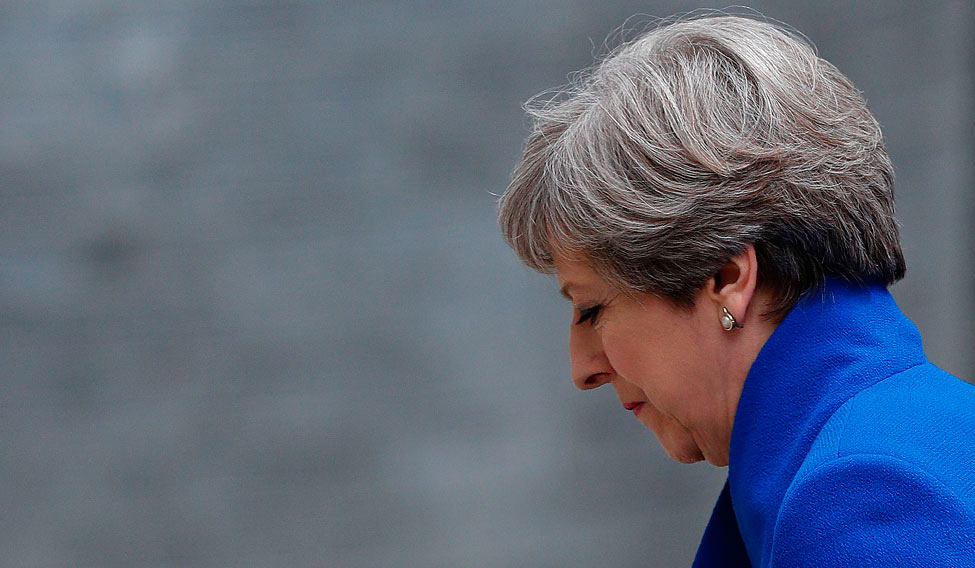British Prime Minister Theresa May was seeking a deal with a small Northern Irish party on Sunday to stay in power after losing her party's parliamentary majority in a catastrophic electoral gamble just days before Brexit talks are set to start.
But with May's personal authority in tatters, there were reports that moves were under way within her Conservative Party to dislodge her, while opposition Labour leader Jeremy Corbyn was insisting she could be ousted and he could replace her.
"Theresa May is a dead woman walking. It's just how long she's going to remain on death row," former Conservative finance minister George Osborne, who was sacked by May when she became prime minister last year, told the BBC.
With Britain due to start negotiating the terms of its exit from the European Union with the bloc's 27 other members on June 19, the political crisis in London could not have come at a worse time.
Those exit talks, expected to be the most complex in post-World War Two European history, are supposed to wrap up before the end of March 2019 – a timeline that was already considered ambitious before May's electoral debacle.
Her Downing Street office had announced on Saturday that the “principles of an outline agreement” with Northern Ireland's Democratic Unionist Party (DUP) had been agreed, only for the DUP itself to cast doubt on that account hours later.
“The talks so far have been positive. Discussions will continue next week to work on the details and to reach agreement on arrangements for the new parliament,” it said.
It was another humiliation for May, and a sign that the socially conservative DUP, with its strong focus on Northern Ireland's specific political complexities, will not necessarily be a compliant partner for her minority government.
The DUP statement put Downing Street on the back foot, prompting a carefully worded response in the early hours of Sunday. That said May had “spoken with the DUP to discuss finalising” a deal in the coming week.
“We will welcome any such deal being agreed, as it will provide the stability and certainty the whole country requires as we embark on Brexit and beyond,” the Downing Street statement said.
CORBYN STAKES CLAIM
Many critics, including Scottish Conservative leader Ruth Davidson, have expressed concerns over the DUP's stances against gay marriage and abortion, among other issues.
Others have also said a Conservative-DUP deal could endanger Northern Ireland's peace settlement, which relies on the British government being a neutral arbiter between those who want the province to remain in the United Kingdom and those who want it to become part of the Republic of Ireland.
“There has been a lot of hyperbole about the DUP since Thursday, a lot of things said, a lot of people who really don’t know what we stand for,” DUP leader Arlene Foster told Sky News on Sunday morning.
“Just to be clear, we will act in the national interest. We want to do what is right for the whole of the UK and to bring stability to the government of the United Kingdom.”
The Conservatives won 318 House of Commons seats in Thursday's election, eight short of an outright majority. Labour, the main opposition party, won 262. The DUP won 10.
Labour's Corbyn told the Sunday Mirror newspaper he saw a route to power himself, although it was not clear how he would command the support of a majority of members of parliament.
Labour's tally, even when added to those of potential allies such as the Scottish National Party and other smaller parties, was still short of a majority.
“I can still be prime minister. This is still on. Absolutely,” Corbyn was quoted as saying.
He said his party would seek to vote down May's Queen's Speech, or programme for government, when she presented it to parliament. Corbyn said another national election might be needed to break the deadlock.
“It is quite possible there will be an election later this year or early next year and that might be a good thing because we cannot go on with a period of great instability,” he told the BBC.
Defence Secretary Michael Fallon, one of May's most loyal supporters, said he disagreed with Osborne's description of her as a “dead woman walking” and he expected Conservative lawmakers to rally behind her.
NEW APPROACH
Fallon told the BBC that in light of the election result a new approach was needed, welcoming the resignation of her two closest aides Nick Timothy and Fiona Hill, who were perceived by many Conservative lawmakers to be high-handed and secretive.
May had called the snap election with a view to increasing the narrow majority she had inherited from her predecessor David Cameron. At the start of the campaign, she was enjoying poll leads of 20 points or more over the main opposition Labour Party.
But after a poor campaign and an unexpectedly stiff challenge from Labour, her plan went disastrously wrong.
The Conservatives now plan to reach a so-called confidence and supply agreement with the DUP, which would involve it supporting a Conservative minority government on key votes in parliament but not forming a formal coalition.
Fallon said the DUP would agree to back the Conservatives on big economic and security issues. He said the parties had a history of friendship, and that did not mean the Conservatives agreed with some of the DUP's more socially conservative positions.
While the to-and-fro between Downing Street and the DUP was unfolding, several British newspapers were reporting that some prominent Conservatives, including Foreign Secretary Boris Johnson and Brexit minister David Davis, were being urged by supporters to challenge May for the party leadership.
Johnson dismissed the reports as “tripe”, tweeting late on Saturday that he was backing May.




